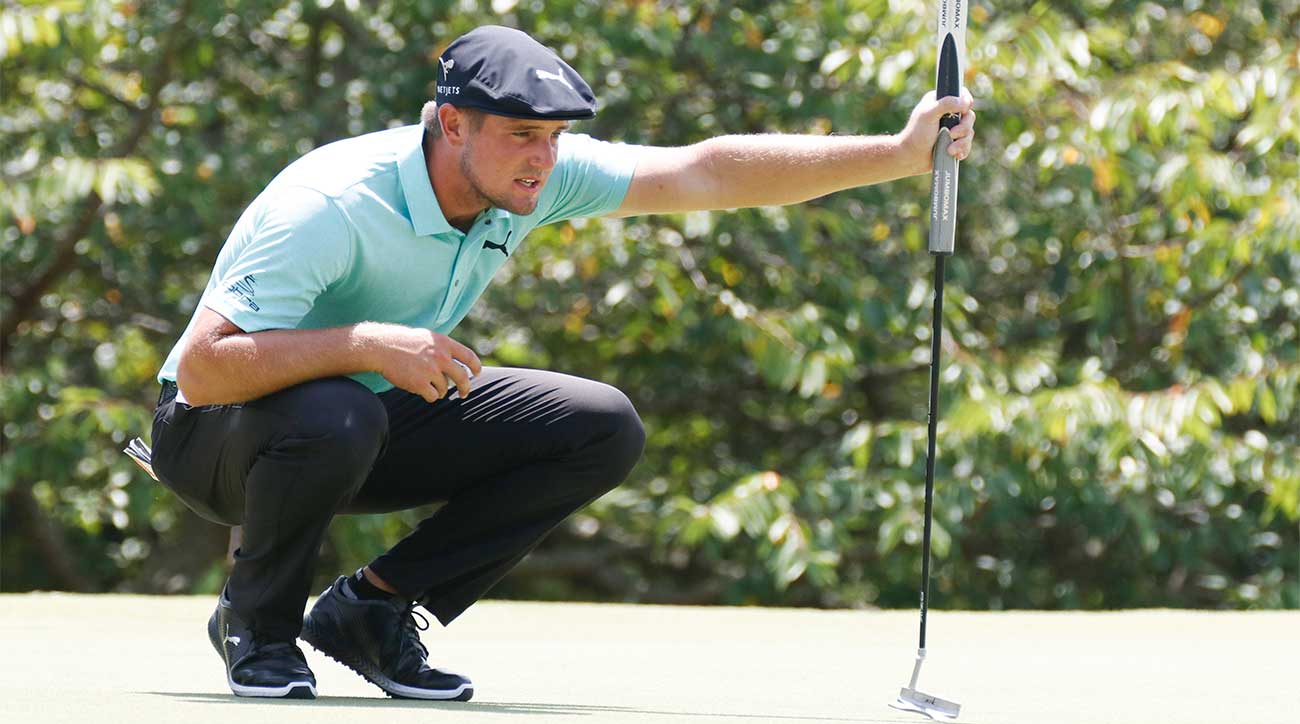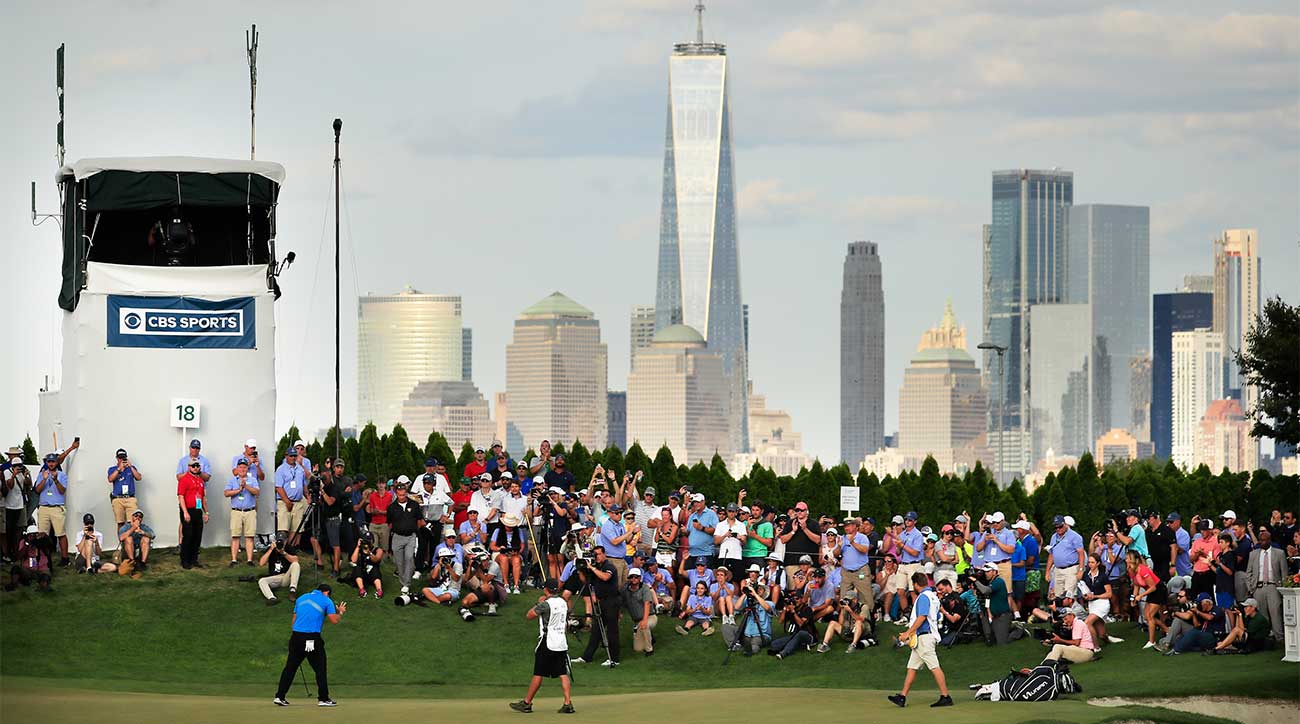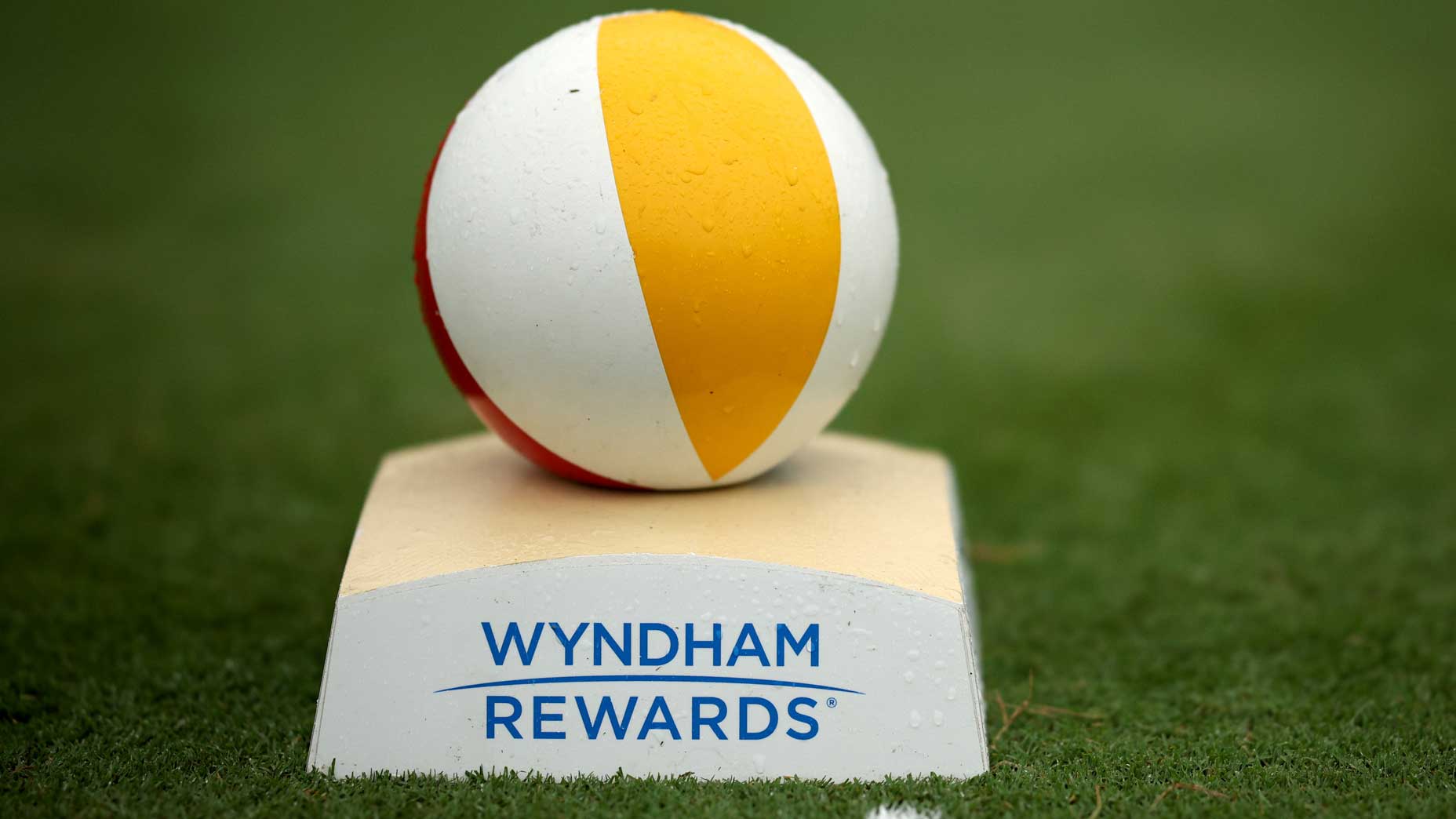 2025 CJ Cup Byron Nelson payout: Purse info, winner’s share
2025 CJ Cup Byron Nelson payout: Purse info, winner’s share
Tour Confidential: Will the PGA Tour now finally address the slow-play crisis?
Check in every Sunday night for the unfiltered opinions of our writers and editors as they break down the hottest topics in the sport, and join the conversation by tweeting us @golf_com. This week we discuss the latest slow-play controversy on the PGA Tour, Tiger Woods’ WD from The Northern Trust, Presidents Cup captain’s picks and more.
1. Bryson DeChambeau faced heavy criticism on social media and from fellow pros when a lengthy putting routine at The Northern Trust went viral. DeChambeau defended himself in what was just the latest of many slow-play debates on Tour, many of which we’ve discussed ad nauseam in this forum. This incident was unique, however, given how many pros publicly called out DeChambeau. Does this feel like a seminal moment for the Tour’s pace-of-play problem — i.e., one that will affect real change — or will this be just another blip on the slow-play radar?
Sean Zak, associate editor (@sean_zak): It does feel like a seminal moment, if only because there’s a receipt now. The Tour has actually said something. And pointed to ShotLink as a source, from which we can (hopefully) expect data to be shared in the future. It’s all overdue, sure, but it’s something. The most seminal thing about this, though, is what seems to be a clear reaction from the Tour to discourse that begins in the public space, on Twitter dot com. LOVE that.
Dylan Dethier, associate editor (@Dylan_Dethier): The last couple of days have felt distinctly different, what with public social media call-outs and a reported Brooks-Bryson putting green showdown. But as Tiger said Wednesday, this is an issue the Tour has had its eye on since the start of his career. The next step, not this one, will ensure it’s more of a seminal moment.
Michael Bamberger, senior writer: This is an issue the Tour had its eye on before Tiger’s father was born. This is just about the biggest issue facing golf, the pace at which it is played. It’s so sluggish, and it turns off so many people, both as potential spectators and as players.
Josh Sens, contributor (@JoshSens): It does feel a bit like last year’s pass interference non-call in the Saints-Rams playoff game: the moment that outrages enough people that something finally has to give. How much will give is another matter. Maybe next week, DeChambeau will only take 1 minute and 59 seconds on a tricky putt. I think we’ll start to see individual players modify their behavior (somewhat), much in the way that Keegan Bradley changed his pre-shot routine a few years ago after being called out for all the twitching and such. But the overall game we see on TV won’t change significantly until the Tour starts slapping big-name players with slow-play penalties, and I’m not holding my breath for that.
John Wood, PGA Tour caddie for Matt Kuchar (@Johnwould): It does feel different. Not only is it a less-than-flattering look to have someone look at a putt for over two minutes, but it’s also pretty awkward and telling when the cameras catch the reactions of the playing partners — eyes rolling, looking at imaginary watches, etc. I feel like we are perilously close to another situation where one or two of the other players in the group just move ahead to send a message (see Sabbatini/Crane at Congressional) while the slow player either figures out what to hit from 100 yards with no win or deciphers the Rosetta Stone. Sometimes these two things take as much forethought. And don’t blame greens books or wind conditions or green firmness. There are a ton of other players in the field who all use greens books and aren’t slow. Know what causes slow play? Slow players. It’s that simple. A couple of years ago Major League Baseball started using pitch clocks in the minor leagues to “train” younger players to play faster. I would love to see this generation play faster, but I’m not holding my breath. But something needs to be done now in junior golf, in high school golf, in college golf and on the mini tours. It’s much easier to learn to play fast as a junior than as a professional. Reach down to the next generation of players and start there.
2. DeChambeau said one issue with slow play is that, as a player who walks quickly, he is unfairly scrutinized because if he hits it farther than a player, he still has to wait for them to get to their ball, dissect their shot and then hit before he can get closer to his ball and figure out his play. He said if he gets up closer to his ball while others are hitting, he’s in their line of sight and that’s not proper etiquette. (DeChambeau first mentioned this at the Masters and reiterated it this week.) Fair point?
Zak: Ahh, etiquette. Glad Bryson has introduced that grey area for further debate. Of course that exists, but that waiting period can still be a data-collecting period, a la reading your putt while someone else is putting. But then again, one yard and three mph’s of wind in difference is going to freak someone like Bryson out. You and me? Nope.
Dethier: Fair-ish, but if he’s really saving that much time walking, his group won’t be on the clock to begin with. One spot where he does have a point: some shots are going to take more than 40 seconds, and that’s OK. But that has turned into it being okay for EVERY shot to go over 40, which is a slippery-slope argument that actually checks out.
Bamberger: No, American golf has never done this correctly. You should advance to your ball at all times, being aware of where other players are, and be preparing your shot all the while.
Sens: The man took more than two minutes to strike a putt. There is no excuse for that, no matter how much agonizing time he spends giving a testy, defensive rationale. You walk fast? Good for you. Now hit it when it’s your turn without putting everyone through all the agony. This was a case of DeChambeau deflecting with a ‘what about-ism.’ Yeah, OK, Bryson, you aren’t the only one. But at this particular moment, we’re talking about you and what you might do differently.
Wood: No. Rarely is there a time when, as a caddie, I can’t get out in front and get the numbers before anyone else in the group is ready to play, regardless of their position in the fairway. You go up, get your numbers — even if you are in his line — and then hustle off to the side and out of his eyeline to do your calculations and plan your shot. There’s no need to be standing at the ball as long as you have the numbers. This argument doesn’t hold water for me.

ADVERTISEMENT
3. Tiger Woods battled back stiffness and poor ball-striking before opening The Northern Trust with a 75 and then withdrawing before the second round. His status for this week’s BMW Championship is uncertain, but he’ll need a good performance to get into the following week’s season-ending Tour Championship. Even before The Northern Trust, Woods said he was “concerned” of how his body might react to three straight weeks of competition. Should he even consider the BMW or just shut it down until the fall?
Zak: He should shut it down. I doubt he will, though. He only played one round of competitive golf. If he felt he could play last week, I imagine he feels like he can play this week. And to him, this could be his last start before the Zozo. If he’s still trying to learn things about his body/game, he’s gotta he inclined to play.
Dethier: To Zak’s point, he’ll play if he can. He wants that Tour Championship start, if he can get it. And there were moments where he looked plenty healthy this week — but not enough to force it on Friday.
Bamberger: When Tiger left Portrush he said, “I just want to go home.”
Sens: No way he doesn’t at least consider it. But we shouldn’t be surprised when he comes right to the brink of his tee time and decides that it just isn’t worth it. He’s learned too many painful lessons before.
Wood: If it’s an oblique, that’s such a tough injury to gauge. It may feel great as you stretch or work out, but as soon as you make a hard swing it may give. I’m guessing he doesn’t play, but that’s obviously just a feeling.
4. The eight auto qualifiers for the U.S. Presidents Cup team will be finalized after the BMW, and there’s been much discussion about whether Capt. Woods would pick himself as one of his four wildcard picks, which won’t be revealed until later. “I think this week kind of put an end to that [conversation],” CBS on-course reporter Peter Kostis said on Saturday. Do you agree?
Zak: I do. Tiger hasn’t played very well in the last three months. He also hasn’t played MUCH. Other, younger players are better suited to win points in the Presidents Cup. Yes, even Chez Reavie.
Dethier: Definitely not. There’s plenty of pressure, public and private, for Tiger to be a competitor in Melbourne. If there’s a way to justify that pick, it’ll happen. He’s still the No. 6 player in the world, by the way.
Zak: [peeks around corner] The only thing keeping him at No. 6 is the lack of events he’s playing.
Bamberger: The Presidents Cup is a TV show, and also a golf competition. So there will be pressure on him to play. But I doubt he will. This captaincy is good training for where the rest of his life can go. The statesman golfer, etc.
Sens: What Michael said. His game is not in a great place, and neither is his body. And he clearly knows that. I think he’ll be satisfied to have his contribution be in the captain’s role.
Wood: No, I don’t at all. The Presidents Cup is in December, plenty of time for Tiger to get healthy and find his game. If I’m Tiger, I get with all my assistants and have a discussion about it. Also if I’m Tiger, I pick myself. And if I’m the PGA Tour or NBC, I definitely pick him.
5. In one of the most confounding developments of the season, Jordan Spieth again worked his way into contention but struggled on Saturday at The Northern Trust. Spieth entered the week ranked fourth in 36-hole scoring average on Tour, but on the weekend ranks 172nd on Saturdays and 195th (out of 196) on Sundays. The trend was mostly true this week. Spieth was in contention after 36 holes but dropped down with a 74 on Saturday, although he did rebound with a 67 on Sunday and tied for 6th. Any brilliant theories on Spieth’s weekend woes?
Zak: I’d normally chalk it up to weird luck, but when it consistently happens on the same days, and those days come after the tournament has decided who is “contending,” it points to some scary nerves! Really, I think it’s just nerves plus an imperfect golf swing.
Dethier: I’ve mused on this plenty, but my main thought is this: it was very good for Spieth, 195th out of 196 in Sunday scoring, to rebound with a 67.
Bamberger: My only theory is this: once it was easy for him, and now it is not. Because life becomes more complicated as one gets older, at least for a while. By the way, all through this, he remains one of the most likable and real people in golf, along with F. Molinari and T. Fleetwood.
Sens: Not a brilliant theory; just an obvious one. Golf’s pesky little gremlins have done what they do best and wormed their way into Jordan’s head. It has happened to the greatest of all time. Why should he be immune to it? Watching a top-flight player like Spieth battle those demons is part of what makes golf at this level so compelling.
Wood: He knows he’s close by his 36-hole scoring average, and he’s pressing and putting extra pressure on himself on the weekend. He knows his game is there, and once he has that one great weekend, he’ll relax and put together a lot more of them. I think Sunday’s 67, under the pressure of moving on in the Playoffs, was a huge round for him moving forward.
6. The U.S. Amateur begins on Monday at Pinehurst. Give the on-the-fence viewer a reason to tune in this week.
Zak: Well, match-play golf is great theater whether it’s the amateur, the Ryder Cup or Dethier and I grinding on Golden Tee. Besides that, the pre-determined Next Best Thing, Akshay Bhatia, is competing in one of his final events as an amateur. I’m hopeful he advances deep and can show off his skills on a big stage.
Dethier: For a while I could pretend I was the best golfer to come out of Williams College in quite some time. That was always a stretch anyway, but not anymore. Sam Goldenring, this year’s D3 national champion, is playing his second straight U.S. Am and should give rooting interest to all Ephs and proud small-college alums across the golf world!
Bamberger: I understand Williams College has a nice course with a short season. I am on the Sam Goldenring bandwagon.
Sens: All that, and beauty shots of Pinehurst itself. Must-see TV.
Wood: Match play. I understand why the networks and tournaments may not love it for PGA Tour events (the risk of losing the big names early), but at the U.S. Amateur most fans don’t necessarily have favorites or big names to watch. But the intensity of match play is just the best thing to watch in golf.
ADVERTISEMENT






